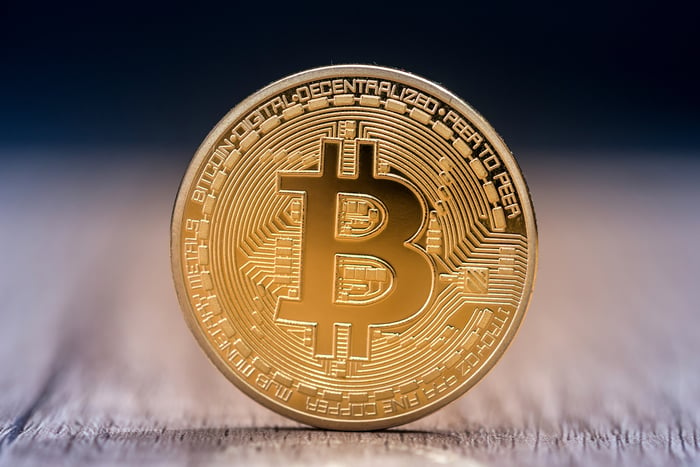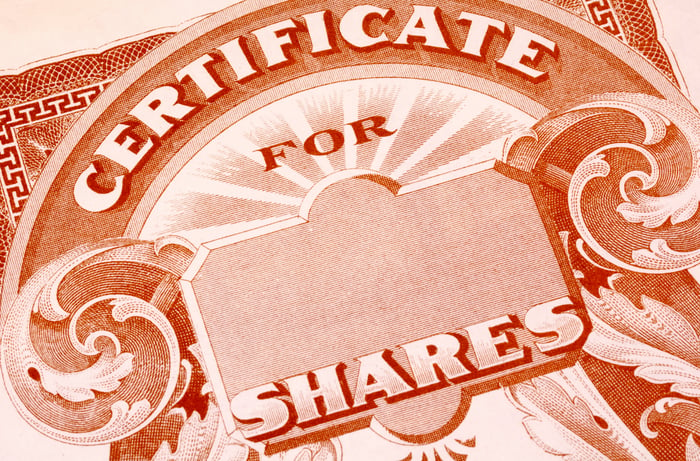Get your gloves on, because you're going to need them. Digital currency bitcoin is absolutely on fire after hitting an all-time high of $4,183.30 over this past weekend.
Since concerns about a possible split into two separate currencies riled the bitcoin community in mid-July, the cryptocurrency has since more than doubled in value. This year alone, bitcoin has quadrupled in value, while on a peak-to-trough basis over the trailing-two-year period, we're talking about a 1,500% increase.
Explaining bitcoin's meteoric rise
Why the bullishness surrounding a currency that's not backed by any government? For starters, the recent split into two currencies, bitcoin and bitcoin cash, has investors in the original bitcoin excited about its future potential. A majority of engineers voted in favor of the BIP 91 upgrade using SegWit2X. This upgrade allows for some of the data within bitcoin's blockchain (its decentralized digital ledger for recording transactions) to be moved out of the main bitcoin network. Doing so should speed up transaction times and settlements, increase the capacity of the bitcoin network, and help to lower transaction fees. In other words, it makes bitcoin more appealing to businesses. The minority who opposed SegWit2X were bitcoin miners who were opposed to smaller transaction fees.

Image source: Getty Images.
We've also witnessed discernable weakness in the U.S. dollar, which is to the delight of President Trump. A weaker dollar helps promote foreign exports. Unfortunately, it comes at the cost of devaluing Americans' currency, which investors tend not to like. Normally when the dollar devalues, investors seek the safety of gold, which is a finite resource and a perceived store of value. However, since bitcoin has protocol built in that allows for only 21 million coins to be mined, it, too, is perceived as a finite resource and has been a safe-haven source for investors.
It's also hard to deny that momentum has played a role. This writer has seen a marked increase in advertisements for investments in bitcoin online, and the allure of the pace at which bitcoin's value is rising has likely drawn in new money. Investors should also understand that bitcoin isn't a traditional "investment" like we see in the stock market. It can be bought and sold, but only a few exchanges allow users to "short-sell" bitcoin and bet it goes down. This could be influencing its rising price as well.
How bitcoin's market cap compares with other assets
Bitcoin has witnessed its market cap, based on the 16,505,312 mined coins per WorldCoinIndex, expand to as much as $69 billion over the past couple of days. With fewer coins mined and a significantly lower price in 2015, bitcoin's market cap was in the $3 billion range. This gives you some idea of just how far this cryptocurrency has come in such a short amount of time.
But how does this compare to the gold market, the S&P 500 (^GSPC -0.66%), and the U.S. dollar's monetary base? Let's take a look.

Image source: Getty Images.
Bitcoin vs. gold
On a purely monetary level, bitcoin is valued at three times the price of an ounce of gold, which closed near $1,290 an ounce this past week. News outlets have been particularly diligent in pointing out how bitcoin's value is leaving gold in the dust. But, it's gold that could still mop the floor with bitcoin if we compare the two based on market cap.
According to a 2013 report from Thompson Reuters GFMS, it was believed that 171,300 tons of gold had either been mined or was still in the ground. Since there are 32,000 ounces per ton, we're talking about 5.482 billion ounces of gold in the entire world, based on this report. If each ounce was worth about $1,290, the world's gold supply would have an implied market cap of $7.07 trillion dollars. That's more than 100 times the market cap of bitcoin at its all-time high!
It's also worth pointing out that numerous reports exist on the world's total gold supply, and some suggest as much as 2.5 million tons may be present (that's over 14 times what Thompson Reuters has predicted). This would imply a $103 trillion market value for gold, or nearly 1,500 times that of bitcoin. Long story short, bitcoin still has a very long way to go to truly catch gold.

Image source: Getty Images.
Bitcoin vs. the S&P 500
Conservatively, bitcoin also trails the market cap of the S&P 500 by a significant amount. The S&P 500 is made of up just a shade over 500 companies, many of which are the largest in the United States by market cap. According to data compiled by SiblisResearch.com, the S&P 500 had a market cap of $21.83 trillion as of June 30, 2017. Of course, the index has also risen nearly 1% since the second quarter ended, implying that its total market cap today is probably closer to $22 trillion, or about 319 times that of bitcoin.
In fact, the largest U.S. stock, Apple (AAPL -1.35%), could run circles around bitcoin by itself. Through Friday, Aug. 11, Apple had a market cap of $813.4 billion, which is almost 12 times higher than the entire market cap of bitcoin.
What's more impressive, Apple ended its most recent quarter with a record cash pile of $261.5 billion. Admittedly, nearly all of this cash is being held in overseas markets, because Apple doesn't want to be taxed for the repatriation of this cash. Still, in theory, Apple could acquire all bitcoin, ethereum, ripple, bitcoin cash, and litecoin, the five largest cryptocurrencies by market cap, and still have approximately $152 billion in cash left over. Would Apple do such a thing? Not a chance. It's focused on returning cash to its shareholders and reinvesting in new technologies. But it does demonstrate just how tiny bitcoin is next to a behemoth like Apple, or the broad-based S&P 500.

Image source: Getty Images.
Bitcoin vs. the U.S. dollar
Lastly, let's take a look at how bitcoin stacks up next to the currency it'd ultimately like to make go extinct -- the U.S. dollar.
According to figures from the St. Louis Federal Reserve as of July 2017, the monetary base was nearly $3.8 trillion, including coins and deposits. The monetary base has increased more than fourfold from the Great Recession, and it's currently about 55 times larger than that of bitcoin, even after bitcoin's enormous run.
Keep your distance from bitcoin and adjacent investments
Despite its recent strength, this writer continues to believe that avoiding bitcoin is a smart move. Without true fundamentals to analyze, deriving a fair valuation on bitcoin is difficult to ascertain. We've witnessed numerous assets increase in value like this before throughout history, and practically every one wound up having its bubble burst eventually. My suspicion is bitcoin will be no different, and uninformed investors are going to be taken to the digital woodshed if they aren't careful.
What's more, the lone bitcoin investment option in the stock market is grossly overvalued. Bitcoin Investment Trust (GBTC 1.17%) is an ETF that currently holds about 173,014 bitcoin as of July 31, 2017. Given the recent run-up in bitcoin prices, the market cap of these bitcoin is just north of $700 million. However, the Bitcoin Investment Trust had a closing market cap on Friday of $1.05 billion, a nearly 50% premium, which is insane! Almost as insane as the 2% annual fee the fund charges.
While bitcoin's underlying blockchain could be intriguing to businesses years down the road after it's been tested on a small scale, the current value of bitcoin makes little sense.





